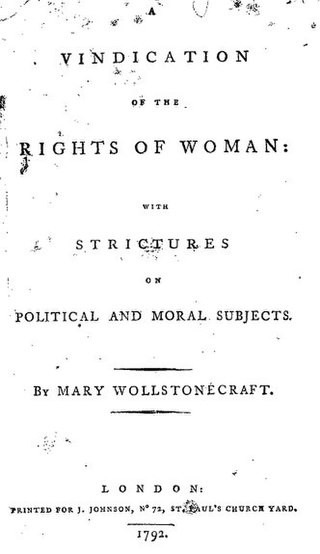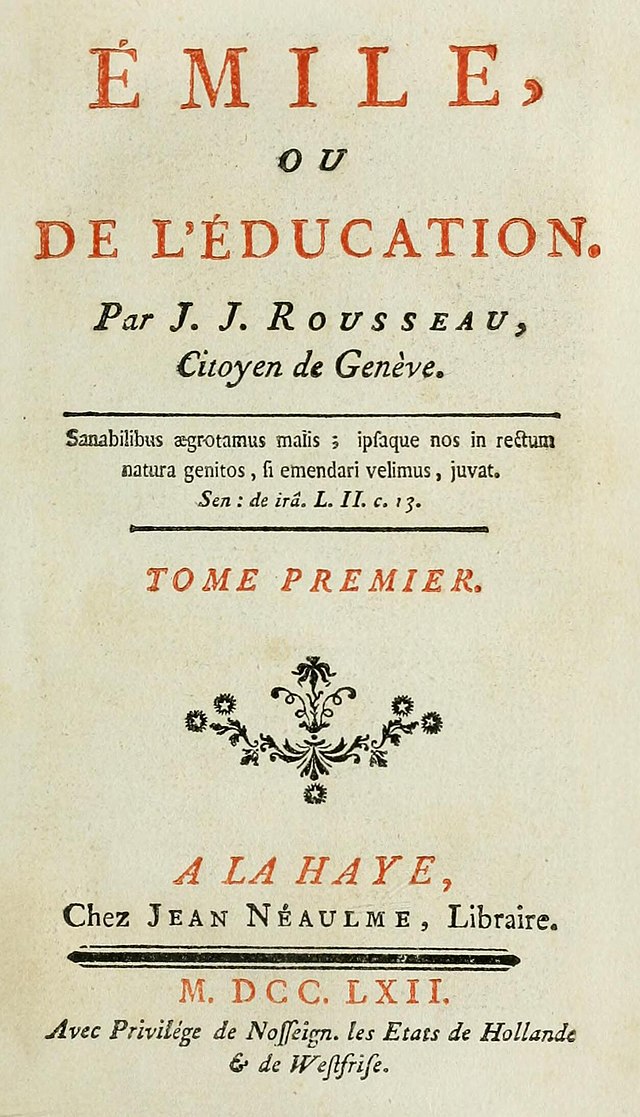热门问题
时间线
聊天
视角
女權辯護
瑪麗·沃斯通克拉夫特的哲學女性主義著作 来自维基百科,自由的百科全书
Remove ads
《為女權辯護:關於政治及道德問題的批判》(英語:A Vindication of the Rights of Woman: with Strictures on Political and Moral Subjects,下文簡稱《女權》),是18世紀英國女性主義者瑪麗·吳爾史東克拉芙特於1793年出版的著作,是女性主義哲學最早的一批作品之一。在這本書中,吳爾史東克拉芙特對18世紀的那些試圖否認女性教育的教育和政治理論家進行回擊。她認為女性的教育程度應當相稱於她們的社會地位。她主張國家必須要有女性,因為女性教育了她們的子女,且因為她們能夠成為丈夫們的「伴侶」,而不僅僅是妻子。吳爾史東克拉芙特還主張:作為人類的女性應當享有與男性相同的基本權利,而不應被視作是社會的裝飾品或是婚姻交易中的財產。[1]

1791年,法國政治家塔列朗在法國制憲議會發表了一篇報告,認為女性只應接受家庭式的教育,這促使了吳爾史東克拉芙特開始寫作《女權辯護》一書[1];她藉由對這一特定事件的評論來展開她對性別歧視的廣泛批判,並譴責了男性鼓勵女性縱容過度情感的行為。為了直接回駁當時的一些事件,吳爾史東克拉芙特在倉促之中寫成了《女權》一書;吳爾史東克拉芙特後來還打算寫出更有深度的續作,但她在完成第二卷以前便不幸辭世。
儘管吳爾史東克拉芙特的確呼籲了特別是在生活領域,譬如道德上的性別平等,但她並沒有明確地指出男女是平等的。因此,她在性別平等上的這種曖昧態度讓後人很難將她歸入現代女性主義者的行列,尤其是當她在書中提到的文字與觀點對她來說是遙不可及之時。儘管現今通常都以為《女權》一書在當時並不受到歡迎,但這是現代人的一種誤解,其建基於的是這樣的一種觀點:認為吳爾史東克拉芙特的一生都受盡謾罵,就如同1798年威廉·戈德溫出版《女權辯護作者傳》後的情況一樣。而實際上,《女權》在1793年發行第一版時已十分暢銷,有一位現代傳記學家還認為「也許是(吳爾史東克拉芙特)那個世紀最有新意的一本書」。[2]
Remove ads
歷史背景

《女權辯護》一書是在法國大革命的動盪背景下寫成的。大革命在英國引發了諸多論爭:在現今多稱為《革命論戰》的這本小冊子中,英國的政治評論家們從代議式的政府討論到了人權,討論到了政教分離。吳爾史東克拉芙特首次加入這場論戰是她在1790年發表的《男權辯護》,該書是為了回擊埃德蒙·伯克《對法國大革命的反思》(1790)而作的[3]。在伯克的《反思》中,他批評了眾多英國思想家與作家對早期的法國大革命抱持歡迎的觀點。雖然眾人將大革命視作是1688年英國限制王權的光榮革命的類似情況,伯克卻指出,恰當的歷史比喻應該是1642年到1651年的英國內戰,其間英國國王查理一世在1649年被處決。他認為法國大革命是一場推翻合法政府的暴力行為,認為平民沒有權力去反抗他們的政府,因為文明是社會與政治共識的成果;文明的傳統不能被頻繁地變更——否則將會導致政治混亂。在《反思》一書出版六周後,吳爾史東克拉芙特發表了《男權》:其中的一個關鍵論點是權力不能基於傳統;她認為,權力的賦予是出於合理與公正的理由,而不應考慮它們在傳統中的基礎。[4]
1791年,塔列朗在法國制憲議會上發表了《公共教育報告》[5]一文,吳爾史東克拉芙特因而受到激勵,決意對塔列朗進行反擊。[6]在塔列朗關於國民教育系統的提議中,他這樣寫道:
我們應該教化女性,不要去追求被憲法否認的權利,而是要去了解與感激授予她們權利的人……世界舞台上的表演者注定是男人。他們適合得到公共教育:在他們看盡人生世態之前:僅在比例上有所不同。父系家庭則更適合於女性的教育;她們不太需要學習如何處理和他人的利益關係,而更需要習慣於平靜與幽寂的生活。[7]

吳爾史東克拉芙特在《女權》中這樣題獻給塔列朗:「很高興地讀完了您最近發表的小冊子,我將本書題獻給閣下:以勸誘您重新考慮這個議題,並充分地衡量我進一步提到的女權與國民教育。」[8]在同一年,法國女性主義者奧蘭普·德古熱發表了她的《女性和女性公民權宣言》,自此,女權這一問題分別成為了法國與英國的政治辯論的中心。[3]
《女權》是吳爾史東克拉芙特在《男權》一書中論點的延伸。在《男權》中,顧名思義,吳爾史東克拉芙特將關注的焦點集中於特定男性群體(18世紀的英國男性)的權利上,而在《女權》裡,她則關注於向「女性」這一抽象類所提供的權利。她並沒有將她的論點限制於18世紀的女性或英國的女性。《女權》的第一章中提出了自然權利的問題,並發問:誰才擁有這些不可剝奪的權利,並以什麼理由擁有。她對此這樣回答道:因為自然權利是上帝所賦予的,那麼社會的一部分去否認另一部分的這些權利便違抗了上帝的旨意。[9]因此,《女權》一書不僅討論了發生於英法兩國的特定事件,還觸及到了同時代的政治哲學家洛克與盧梭提出的許多更大的問題。[10]
Remove ads
主題
與18世紀哲學家們常見的做法不同,吳爾史東克拉芙特在創作她的作品時並沒有採用正式的論證或符合邏輯的雜文風格。《女權》是一篇很長的評論文,它所有的主要話題都出現在開篇的第一章里,然後,再通過從不同的角度切入的方式,來對這些話題進行了深入的討論。另外,《女權》採用的語氣還混合著理性的辯論與感性的熱情修辭[11]。
在18世紀,「感性」是可被附著於某類道德信仰上的生理現象。醫生和解剖學家認為,有著更敏銳神經的女性,要比男性更易遭受情感的影響。[12]而與感性相連的情感過剩,也在理論上產生了一種道德同情心:讓這些感性的人更容易對那些受苦的人產生共鳴。因而,歷史學家們將人道主義進步的成就——譬如奴隸貿易的成功廢除——歸功於感性的能力以及擁有並發揚這種能力的人。[13]但泛濫的感性亦會給一個人帶來壞事,如同學者巴克-本菲爾德說的那樣:「先天性的神經敏感亦被證明為與痛苦、虛弱以及易受疾病侵染相連」[12][14]。
在吳爾史東克拉芙特寫作《女權》的那個時代裡,感性已經遭受了持續經年的攻擊。[15]最初曾許諾能用同情心將個體團結起來的感性,在當時已被視為是「極端的分離主義者」;採用感性措辭的小說、戲劇與詩歌所聲稱的個體權、性別自由及新式家庭關係,都不過是憑感覺而為之的。[16]此外,如另一位感性學者珍娜特·托德所認為的:「對許多英國人來說,對感性的崇拜似乎會讓整個國家變得女性化,讓女性過度地突出,並導致男性被弱化。」[17]
Remove ads
在《女權》一書中,吳爾史東克拉芙特的一個中心論點是:女性應該受到理性教育,以給予她們向社會作出貢獻的機會。在18世紀,無論是教育哲學家還是行為手冊的作者,都認為女性不具備理性或抽象的思維。他們認為女性太易受到感性的影響,並太難達致清晰的思維。吳爾史東克拉芙特與凱薩琳·麥考利和赫斯特·沙蓬這些女性改革家們一道,主張女性毫無疑問地具備理性思維的能力,並從而應當受到教育。在她的行為手冊《女教論》(1787年)中,在童書《真實生活的原創故事》(1788年)中,以及後來的《女權》中,吳爾史東克拉芙特均指出了這一點。[18]
她在序言中這樣寫道:「我的主要論點建基於這樣的一個簡單原理,即如果女性沒有通過教育作好成為男性伴侶的準備時,她的知識與美德便會停止進步;真理必然對所有的人都有效」[19],吳爾史東克拉芙特認為,當一個社會缺乏受過教育的女性時,那麼這個社會便會退化:這主要是因為年幼子女啟蒙教師的這一社會角色大都由母親擔任。[20]她將未受教育女性的問題歸因於男性,是「一套錯誤的教育體系;而這套錯誤的教育體系,來源於一些討論教育問題的書籍,這些書籍的著述者們與其說是把女性當作人來看待,還不如說是當作女人來看待更準確些」。[21]女性具有理性思維的能力;只有當男性拒絕為她們提供教育,並鼓勵她們輕薄時(吳爾史東克拉芙特將愚蠢的女性稱作是「哈巴狗」和「玩具」[22]),她們才會看上去不具備此種能力。[23]
詹姆士·福代斯和約翰·格列哥里等行為手冊作者以及盧梭等教育哲學家認為,女性不需要理性教育;吳爾史東克拉芙特針對這一觀點進行了抨擊。(盧梭的這一著名論點出現在1762年的《愛彌兒》一書中,他認為:為了取悅於男性,女性應該受到教育。這一觀點激怒了吳爾史東克拉芙特,讓她不僅針對該觀點,還針對盧梭本人進行了抨擊。[24])
為了說明在當時的教育理論中,女性地位所受到的限制,吳爾史東克拉芙特這樣寫道:「女人從幼年時代開始就被教導:美貌是女人的權杖,因而心靈要為身體塑造自己;心靈只能在它的鍍金鳥籠里徜徉漫步,並且只能努力去讚美它的牢籠」[25],其言下之意便是,如果沒有這種破壞性的思想,如果沒有去鼓勵年輕女性把注意力集中於美麗與外表的成就上,她們將會取得更多的成就。妻子能夠成為她們丈夫的理性的「伴侶」,甚至還能從事她們所選擇的事業:「女人當然可以去研究醫學技能,並且可以去做醫生或者是護士。分派她們去做助產士似乎比較合適……女人也可以去研究政治……同樣也可以從事各種各樣的工作。」[26]
對吳爾史東克拉芙特來說,「最理想的教育」是「為增強體質和培養精神而精心籌劃的理性鍛鍊。或者換句話說,就是要使個人獲得獨立自強的品德習慣。」[27]除了進行廣泛的哲學辯論外,吳爾史東克拉芙特還為國民教育勾勒出了具體的計劃,以向塔列朗的計劃進行反擊。在第十二章「論國民教育」中,她呼籲所有的兒童都應在「鄉下的走讀學校」[28]進行學習,同時「為了激發他們熱愛家庭和家庭樂趣」[29]還應該在家庭中接受教育。她還主張學校教育應該男女同校,認為成年男女的婚姻是「社會的紐帶」[30],他們也應「依照同一模式接受教育」[31][32]。
总结
视角

《女權》一書到底在多大程度上屬於女性主義作品這一問題,是存有爭議的;由於對「女性主義」各種不同的定義,不同的學者會得出不一樣的結論。而吳爾史東克拉芙特本人也絕不可能會把自己的作品加上女性主義標籤的,因為直到1890年代,才出現了「女性主義」(feminism)及「女性主義者」(feminist)這兩個單詞。[34]此外,在吳爾史東克拉芙特在世的時期里,女性主義運動還尚未出現。在介紹吳爾史東克拉芙特的開創性作品時,芭芭拉·泰勒這樣寫道:
(將吳爾史東克拉芙特的觀點)稱作是女性主義是值得懷疑的,而我是在經過大量考慮後才決定這樣做的。(女性主義的)標籤顯然是時代錯誤的……將吳爾史東克拉芙特的思想視為是19至20世紀女性主義主張的先聲,則意味著是對其中的一些關鍵元素的拋棄或扭曲。一些主要的例子……是對她宗教信仰的普遍忽視,以及對她是資產階級自由主義者的誤傳,這一併導致了其宗教的、烏托邦式的激進主義被世俗的、階級黨派式的改革主義所取代,這與吳爾史東克拉芙特所夢想的萬物齊樂的應許時代是截然不同的。而更重要的,無論如何地把個人英雄主義的政治標籤強加給吳爾史東克拉芙特,這都會與她在提倡女性解放時受道德驅使的理由格格不入。吳爾史東克拉芙特認為,女性的首要追求是實現她們的美德,正是出於這一目的,她才尋求她們的解放。[35]
在《女權》一書中,吳爾史東克拉芙特對性別平等的觀點,與十九世後期至二十世紀的女性主義者不盡相同。舉例而言,她並不強調男女平等,而是指出在上帝眼中,無男女之別,因此不論男女,都應遵從相同的道德準則。[36]對吳爾史東克拉芙特來說,男女在最重要的生活領域上是平等的。雖然對21世紀的讀者而言,這樣的觀點並不具備什麼革命性,但在18世紀的那個時代,它卻是推動社會變革的動力。譬如,它指出了無論男女——而不僅僅是女性——都應該謙遜端莊[37],都應該注重婚姻的神聖性[38]。吳爾史東克拉芙特的說法,暴露出了18世紀後期的性別雙重標準,並對男性作出了相同於女性的德行要求。
不過,吳爾史東克拉芙特的平等觀點卻與她對男性在力量與勇氣上擁有之優越地位的敬重相對立。[39]在以下的這段著名引文中,她模稜兩可地寫道:
請不要因此下結論說,我希望顛倒萬事萬物的秩序。我早就已經承認,從身體的構造上來看,上帝似乎是為了讓男人獲得更大程度的美德而將男人創造出來的。我所說的是整個男性共同體,但是我找不出任何理由來作出結論,說男人的品德在本質上應該是存在差異的。事實上,假如品德只有一個永恆不變的標準,那麼怎樣對男人品德的性質作出區分呢?因此,如果我相應而生地得出結論,我一定會堅定地認為,所有男人的美德都存在一個同樣的簡單方向,如同我堅持認為上帝只有一個一樣。[40]
此外,吳爾史東克拉芙特還呼籲男性——而不是女性——採納她在《女權》中所提出的社會與政治變革。她認為未受過教育的女性不能夠改變自身的境遇,而必須要依靠於男性的幫助。[41]吳爾史東克拉芙特在第九章「社會不合理差別的有害後果」的結尾這樣寫道:
因而我願意勸服那些富有理性的人相信我的某些看法的重要性,並且說服他們冷靜地盤算一下我這些觀點的整體意旨。我要向他們的理智呼籲;既然作為同胞,我要以一個女性的名義,要求他們的內心具備一點點同情心。我懇求他們去解放自己的伴侶,從而使女人成為他們真正的配偶!
男人只要慷慨地打碎我們身上的枷鎖,並且滿意於跟一個有理性的夥伴共處,而不是滿足於她們奴性的屈從,那麼他們就一定會發現我們是更規矩的女兒,更深情的姐妹,更忠實的妻子,更有理性的母親——總而言之一句話:更好的公民。[42]
在她的最後一部小說《瑪麗亞:女人的受罪》(1798)中,吳爾史東克拉芙特用小說的筆調續寫了《女權》一書。在現在,一般都認為《瑪麗亞》是吳爾史東克拉芙特最為徹底的女性主義作品。[43]
Remove ads
在《女權》中,吳爾史東克拉芙特針對虛偽泛濫的感性(特別是當時的女性帶有的)進行了十分嚴厲的批評。她認為屈從於感性的女性「就連瞬息而逝的情感也會使得她們的內心波動不已」;因為這樣的女性是「她們的感官的犧牲品」,她們便不能理性地進行思考。[44]實際上,她們不但對自己造成了傷害,她們還對整個文明造成了傷害:她們不能讓文明走向高雅,而會讓文明走向毀滅。但吳爾史東克拉芙特的理性與感性並不獨立;她認為它們應相輔相成。對吳爾史東克拉芙特以及18世紀的重要哲學家休謨來說,激情是其所有理性的基礎。[45]這是吳爾史東克拉芙特在她的整個寫作生涯中都反覆提到的一個主題,特別是在小說《瑪麗:一篇小說》(1788)與《瑪麗亞:女人的受罪》中。
作為女性不應受感情過度影響的論點的一部分,吳爾史東克拉芙特強調說,女性不應屈服於她們的身體或情慾。[46]這個論點導致了許多的現代女性主義者認為吳爾史東克拉芙特在刻意迴避對女性性慾望的承認。科拉·卡普蘭認為,「對女性性慾一慣的消極攻擊」[47],是《女權》一書的「主導思想」。[48]例如,吳爾史東克拉芙特建議她的讀者在理想和睦的婚姻中「冷靜地把激情平息為友情」。[49]她寫道,「兩個品行優秀的青年人結婚,如果有某種情況阻礙了他們的情慾」[50]是值得慶幸的。[51]吳爾史東克拉芙特還認為「愛情和友情不可能在同一個人的內心存在」[51][52]就像瑪麗·普維解釋的那樣,「吳爾史東克拉芙特暴露了她的恐懼,她對女性的情慾會招致男人的好色與下流注意力的恐懼……(認為)除非女性能夠超越她們肉體的欲望和形態,她們才不會被其身體所控制。」[53]如果女性不對性慾感興趣,她們便不會被男人所支配。吳爾史東克拉芙特擔心女性會被「不切實際的、飄忽不定的感情」[54]所毀滅,即擔心她們只會對滿足其色慾感興趣。[55]由於《女權》一書將女人生活中的性慾排除在外,卡普蘭對此總結道:「表現出了對性的極端排斥」[56],同時還「誇大了性在女人生活中的重要性」[57]。吳爾史東克拉芙特太執著於將性慾從她描繪的理想女性身上擦除,以致於在最後,堅持性慾缺席的她反而將其推向了前席。[58]但就像卡普蘭和其他人評論的那樣,吳爾史東克拉芙特有可能是被迫做出這種犧牲的:「需要注意的是,(十八世紀時的)女性在政治權利和個體獨立上的主張被接受與否,不可避免地取決於她是否有著節制而純潔的性經歷。」[59]
Remove ads

一位著名的吳爾史東克拉芙特學者克勞迪婭·詹森曾將《女權》一書稱為「共和宣言」[60]。詹森認為,吳爾史東克拉芙特有著十七世紀新教徒的共和思想,並且強調男女性的角色必須分明。[61]她認為,在吳爾史東克拉芙特的立場看來,「趨向女性化的男性是社會根基被削弱的原因」[62]。也就是說,如果任由男性擁有堅強與多愁善感的個性時,女性的地位將變得模糊不清,並難以在社會上立足。[63]因此,詹森認為,吳爾史東克拉芙特對女權至大的主張,亦抱持反對的意見。
在《女權》裡,吳爾史東克拉芙特所追求的,是一種消滅包括君權在內的所有特權的共和主義。她還簡要地提到,政府應該代表所有男女公民的意見。但她大部分的「政治批評」,就像另一位吳爾史東克拉芙特學者克里斯·瓊斯所闡述的那樣,「是用道德的措辭來表達的」[64][65]。吳爾史東克拉芙特的美德定義關注於個人的愉悅,而不是整個社會的利益。[65]這表現在了她對天賦人權的解釋上:因為權利源自上帝,她主張義務應與權利相連,而每個人都應負有義務。不過,對吳爾史東克拉芙特來說,由於家庭向個人灌輸了共和主義與仁愛的思想,因而在她對社會團結與愛國主義的理解中,家庭發揮著至關重要的作用。[66]
Remove ads
與前作《男權》一樣,《女權》在許多方面反映出了中產階級的世界觀。吳爾史東克拉芙特將處於中間階層的中產階級稱作是「最能表現出(其)本來面目」[67]的人。她亦頻繁地讚美謙遜與勤奮,以及在當時與中產階級相聯繫的美德。[68]除了站在中產階級的立場上呼籲中產階級的精神外,吳爾史東克拉芙特還對富有階層進行了抨擊,批評他們用她使用的相同論點去反對女性。她指出,富人是「浮華、邪惡和虛榮的,」[69]稱「那些懦弱而虛偽的人們超出了她們同胞的正常需求和情感,她們以早熟的矯揉造作的方式摧毀了惟一的道德基礎,並且在整個社會中傳布了腐化墮落的不良風氣」[70]。
不過,吳爾史東克拉芙特對富人的批判,並不代表著她同時表現出了對窮人的同情心。對她來說,窮人是幸運的,因為他們不會受到財富的羈絆:「為了生活的必需而努力奮鬥的人,是幸福的;因為,這些奮鬥將會避免使他們僅僅由於懶惰而成為耗費精力的惡行的犧牲品。」[71]此外,她認為慈善只會帶來消極的結果,因為,就像瓊斯總結的那樣,她認為「如果讓富人們都披上了道德的外套,那麼社會的不平等將會持續下去。」[72]
在她對國民教育提出的方案中,吳爾史東克拉芙特保持了對階級的劃分(這是智力訓練的一個例外),她認為:「在9歲以後打算學做家務活的女孩子以及準備學習技工專業的男孩子,應該轉到其它學校去接受在某種程度上適合於每一個人目的的教育……才能出眾或者是富有的青年人,現在可以到另外一所學校學習古代語言和現代語言以及科學原理,並且在一個更為廣泛的範圍內繼續歷史和政治學的研究,純文學也不應該排除在外。」[73]
Remove ads
修辭與風格

為了不負文化上對女性作家的期望,並遵守政治和哲學論文的一般慣例,吳爾史東克拉芙特在她的《女權》中構造出了一種由男性陽剛與女性陰柔相結合的獨特風格。[74]她用哲學化的語言寫出了這一篇由論點與原理所構成的論文[74];不過,她亦在《女權》中展現出了她的個人風格,例如採用「我」和「你」的人稱代詞,使用破折號與感嘆號來表達情感,並利用了自傳式的來源引用,因而在其字裡行間體現出了鮮明的女性特點。[11]另外,《女權》的文學體裁是行為手冊、短篇雜文及小說的混合體;同時,這亦證明了該體裁的文字也能用於評論諸如權利這樣的哲學話題。[75]
儘管吳爾史東克拉芙特反對泛濫的感性,但為了引起讀者的興趣,她在《女權》中間或地使用了不少修辭手法。在書中,許多富有情緒化的評論針對的都是盧梭。舉例而言,在摘錄了一大段《愛彌兒》(1762)的文字後,吳爾史東克拉芙特簡潔地評價道:「對於這一天才的文章,我除了說它是色情哲學之外,沒有別的什麼話可說。」[76]另外,在對盧梭關於女性教育的方案進行指責之後,她調侃道:「我必須描述一幅不同的畫面,以緩和一下自己的情緒。」[77]
這些簡潔扼要的激烈言辭,其意在將讀者引導站在她的一方(假若讀者同意她的觀點的話):儘管吳爾史東克拉芙特宣稱將使用平實的習作風格,以讓她的思想影響到更大範圍內的可能讀者[78];但是,她實際上混合了平實理性的政論風格與激情感性的浪漫風格,以達到證明一個人可以集理性與感性於一身的目的。[79]由此,她用理性的論證與感性的修辭共同捍衛了自己的立場。
為了生動地描述出女性的社會狀況,吳爾史東克拉芙特採用了幾種不同的類比。[80]她常常把女性與奴隸進行比較,認為女性的無知與軟弱導致她們的社會地位低下。但在同時,她亦將那些用詭計和騙術操縱男人的女性,比作是「反覆無常的暴君」[81]。在這一點上,她推論得出:女性如果不成為奴隸,就會成為暴君,就如同一枚硬幣的兩面那樣分明。[82]此外,吳爾史東克拉芙特還將女性與士兵作比:認為她們與軍人一樣,「以謹小慎微的禮貌來踐行處於次要地位的美德」[83];還與富人的財富作比:認為「財富以及女人的溫柔無一例外地導致了人類的墮落」[84]。
Remove ads
修訂
為了對塔列朗的演講以及當時的一些事件進行回駁,吳爾史東克拉芙特被迫在匆忙中完成了《女權》的創作。在《女權》即將完成時,她在給她的朋友威廉·羅斯科寫的信中談到:「我對自己沒有充分地來評判這個主題感到不滿意——別以為我是假裝謙虛——我的意思是說,如果我能有更多的時間來寫作的話,我會寫出一本從各方面來說更好的書來……我打算在完成下一卷後便付印成書,因為讓出版人在我完成最後一頁前便來提稿是件令人很不愉快的事。」[85]當吳爾史東克拉芙特為《女權》的第二版進行修訂時,她抓住了這個機會:不僅修正了一些小的拼寫和語法錯誤,還對她關於女性主義的論證進行了鞏固。[86]她改變了一些關於女性和男性差異的論述,反映出性別間的更平等的主張。[87]
吳爾史東克拉芙特沒有完成《女權》的第二部,儘管她的丈夫威廉·戈德溫在她的《遺稿集》中發表了她生前寫好的「心得」,其中的內容「絕大部分都已經打算納入《女權辯護》的第二部」[88][89]。不過,絕大多數的學者都認為,她的最後一部小說《瑪麗亞:女人的受罪》是《女權》一書的小說化續章。而這部在她生前同樣沒有完成的小說,亦包含在了後來出版的《遺稿集》裡。[90]
反應與影響

當《女權》在1792年出版第一版後,《分析評論》、《綜合雜誌》、《文學雜誌》、《紐約雜誌》與《每月評論》這些當時的雜誌都給予了其正面的評價。但是,直至今日,《女權》亦不能免於惡評。[91]在出版第一版後沒隔多久,第二版也於同一年付印出版。另外,《女權》當時在美國也出現有幾個版本,而且還被翻譯成了法文。泰勒將其稱讚為「一場直接的成功」[92]。此外,瑪麗·海斯與瑪麗·魯濱遜等作家還在他們自己的作品中特別地提到了吳爾史東克拉芙特的作品。海斯在她1796年著的小說《愛瑪·克蒂尼傳》中引用了《女權》,並將其中的女性角色塑造成了吳爾史東克拉芙特式的理想女性。[93]而且,即使是漢娜·莫爾這樣曾親自譴責過吳爾史東克拉芙特的保守女性,亦與吳爾史東克拉芙特有著許多相同的價值觀。如同學者安妮·梅勒寫的那樣,莫爾與吳爾史東克拉芙特都希望社會能建基於「基督信仰的美德、理性的仁愛、誠實正直、個人美德、社會義務的履行、勤儉節約、艱苦樸素與勤奮工作。」[94]在1790年代的早期,英國社會的許多作家都加入了一場關於女性社會地位的激烈辯論中。例如,著名的詩人和雜文作家安娜·巴鮑德與吳爾史東克拉芙特曾你來我往地辯論;巴鮑德曾發表過幾首詩來回敬吳爾史東克拉芙特的作品,而吳爾史東克拉芙特在《女權》的腳註中又對她的一首詩發表了評論。[95]
在吳爾史東克拉芙特於1797年逝世後,她的丈夫戈德溫於次年出版了《女權辯護作者傳》一書。該書透露了吳爾史東克拉芙特的許多不為人知的私生活:她的私生女、她的戀愛,以及她曾打算自殺的企圖。儘管戈德溫認為自己是出於對妻子的愛情與同情,而如實地描述她的生活的,但當時的讀者在讀到這本傳記後,仍然震驚於吳爾史東克拉芙特的這種另類生活方式;而這也導致吳爾史東克拉芙特成為了眾人辱罵的對象。由於吳爾史東克拉芙特的思想與她的生活有著密不可分的聯繫,因而許多女作家都再也不敢在自己的作品中冒險提及這些思想。舉例來說,先前曾經大力提倡吳爾史東克拉芙特及其作品的海斯,在她於1803年發表的《傑出與著名女性傳》中,根本就沒有提到吳爾史東克拉芙特。[96]瑪利亞·埃奇沃思在她於1802年發表的小說《貝琳達》中,與吳爾史東克拉芙特劃清了界線;她用哈麗雅特·弗里克這個角色來將吳爾史東克拉芙特諷刺為極端的女性主義者。[97]但是,也有像珍·奧斯丁這樣的並沒有拒絕吳爾史東克拉芙特思想的人。雖然對吳爾史東克拉芙特的態度截然不同,但埃奇沃思與奧斯丁都認為女性對於國家的發展至關重要;此外,她們也認為女性具有理性的力量,並應該去選擇適合她們的婚姻。[98]
針對吳爾史東克拉芙特的負面看法持續了一個世紀。直到19世紀中葉,《女權》一書才以重印版的面貌出現在市面上——但其惡名卻依然存在。喬治·艾略特寫道:「在某些領域,《女權》還要面對著一些含糊不清的偏見,這些偏見認為它在某方面是一本應受譴責的書。但如果讀者帶著這種印象去閱讀這本書的話,會驚訝地發現這本書具有的罕見的嚴肅性、樸素的道德性及深刻的重要性」[99]。雖然《女權》一書也許為女性主義的觀念鋪平了道路,但對20世紀的女性主義者來說,吳爾史東克拉芙特的生活經歷的影響遠大於其著作;[100]她的另類生活方式促使了她們去嘗試新的「生活體驗」[101],就像吳爾夫在她那篇關於吳爾史東克拉芙特的著名雜文里寫的那樣。[102]但是,同樣也有證據證明《女權》一書對現代的女性主義產生影響的。一位女性主義者阿亞安·希爾西·阿里在批評伊斯蘭教對女性的相關規定時,在其文章中引用了《女權》一書,寫到她「受到女性主義的先驅思想家瑪麗·吳爾史東克拉芙特的鼓舞:吳爾史東克拉芙特告訴女性,她們擁有與男人一樣的能力,並應該享有相同的權利。」[103]
Remove ads
引用
參考文獻
外部連結
Wikiwand - on
Seamless Wikipedia browsing. On steroids.
Remove ads
